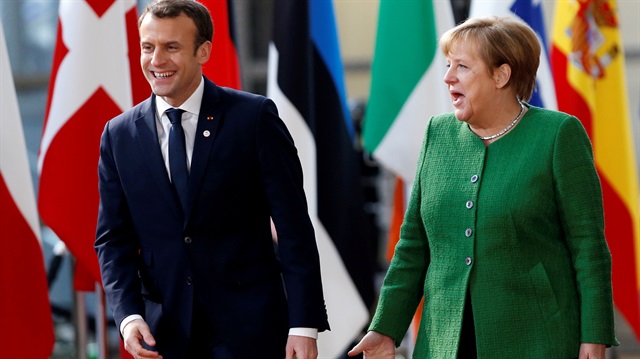
President Emmanuel Macron and German Chancellor Angela Merkel meet in Paris to discuss euro zone reform on Friday, their first encounter since her new coalition took office, but they may struggle to find common ground on further change in Europe.
Merkel, narrowly re-elected to a fourth term as chancellor, wants to fulfil her incoming government's pledge to deliver a "new start" for Europe, while Macron, too, has made euro zone overhaul a key goal since taking power last May.
There is already detailed reform under way in the euro zone, including the creation of a banking union among its 19 member states and plans for a single deposit insurance scheme that would protect individuals' savings.
However, the appetite for deeper changes, such as Macron's grand ideas for a separate euro zone budget, a single euro zone finance minister and a dedicated fund that would help countries facing external shocks and imbalances, is limited.
Members of Merkel's conservative bloc are wary of more comprehensive European integration and shudder at the idea of Germany, Europe's economic powerhouse, pooling risks and debts with other, less financially fit countries.
Meanwhile, the Netherlands and seven other EU states issued a joint statement in early March saying a lot had already been done to strengthen the architecture underpinning Europe's economic and monetary union, and the first priority should be to ensure countries implement those steps.
Macron has said his plans are for the long-term and will be the natural outcome of deeper euro zone integration. But that raises the question of what France and Germany - often referred to as the motors of the EU - can come up with in the short-term to show they are delivering on a stronger European project.
Macron, 40, has waited impatiently for the Germans to form a government and is itching to press ahead.
The chancellor, 63, knows that Macron, in his first term, needs to succeed with his reform drive, well aware that a large proportion of France's electorate remains susceptible to far-right and far-left populists sceptical about the EU.
"I am very pleased that France is coming forward very actively on the European stage again and that Emmanuel Macron is making proposals," Merkel told broadcaster ZDF on Wednesday.
In January, when they last met for formal discussions on the issue and Merkel was still negotiating over a coalition, the pair said they hoped to present their plans to member states at an EU summit in March.
But that gathering is now a week away and it appears very unlikely that they will have anything concrete to put forward by then. Instead, it is more likely that any proposals will come together ahead of the next EU leaders' meeting in June.
Yet even if they can get the 17 other euro zone members to agree to further reforms - for example how their 500 billion euro ESM rescue fund is used, there will be a tight schedule to implement those changes before the EU is tackling its next big challenges: Britain's formal exit from the union in March 2019 and European Parliament elections shortly thereafter.














